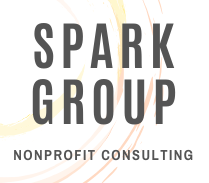Nonprofit Consultants: What is Their Role and How Much do They Cost?
There are a lot of questions regarding nonprofit consultants. You may wonder about the consultant’s role, how much they cost, or where to find a consultant. This post will walk you through determining whether or not you need to hire a consultant, then how to price your work and where to find a consultant partner.
Role
“What does a consultant do, anyway?”
There are several types of nonprofit consultant roles. There are service providers who will work with you for a short period of time to set up your software systems, project managers who will be your hands and feet to run an event, or strategists who will work with you to develop goals and processes. However, what all of these consultants have in common is that they are outside help, typically utilized for shorter periods of time, who allow you to increase organizational capacity.
“Why would I need a consultant?”
You might not! Plenty of organizations run their own strategic plans, develop marketing calendars and approaches, and train their board and staff internally. If you feel that you have the right people and skills necessary for the project then there is no need to engage outside help.
Here are three questions to ask when considering whether or not you need to hire a consultant. If you answer yes to these questions then a consultant is a good option for your organization's needs.
Ask yourself…
Do I need an outside perspective with specific tools and resources on best practices?
Does my organization have the staff capacity to handle this challenge or do we need more support?
Do I want to participate in the process or facilitate the process?
Cost:
“How much do consultants cost?”
This is a common curiosity of nonprofit leaders and it’s easy to understand why. The costs vary significantly based on a few factors. First, the cost will depend on the service you need. For example, it may cost you under $1,000 to have a consultant set up your software, but you can contrast that with the cost to hire a capital campaign consultant which can be in the hundreds of thousands of dollars.
Here are some basic rules of thumb: determine the service, research comparable costs in your area, and then determine the level of service that you need. Sometimes you may want a six-month strategic planning process and other times you may want a one-day strategic planning workshop.
Don’t forget, that nonprofit consultants can help you save money by providing highly skilled workers without the costs of overhead, benefits, and more!
Lastly, knowing what you can afford before you search for a provider is helpful in determining the best consultant fit. You want to avoid the dance of, “What do your services cost?” and, “Well, what is your budget?” This is a dance that frustrates nonprofit leaders and consultants alike. Consultants base their fees on scope, years of experience, return on investment, your organization’s size, and more.
Finding a consultant partner
“How do I write an RFP?”
I’ll tell you a secret… consultants hate requests for proposals (RFP). If you are stressing about how to write the best RFP to find a consultant — don’t. You can post an RFP with your local nonprofit association or on idealist.com and you will receive a lot of responses. However, there are other ways to find the best match. Here are some options:
Sign-up for a free nonprofit profile with www.nonprofit.ist and scroll through a directory of consultants. Each person listed needed to be vetted to show up on their list.
Ask a colleague for a referral
Search for consultants on LinkedIn and follow them to learn more about how they work
When you find a few that you like, request a meeting with them. Almost all consultants offer a free chat to determine if your project is a good fit for their work. On those calls be prepared to describe your project and ask questions about the way the consultant operates. If you like what they have to say then ask them to submit a proposal.
In summary, consultants aren’t always the best option for every situation, but they can be a great solution for your organization’s needs. Nonprofit consultants can provide interim help if you have a staff member leave temporarily, they can provide skills that don’t exist within your team, they offer cost savings and high ROI by offering skilled labor without the costs of overhead and benefits, and they allow you to participate in the work rather than facilitate the work. Doing your research to know your project front and back and to be aware of comparable costs will help you determine the cost that works for you and find the best consultant fit. Lastly, don’t bother with the RFP. They are a pain to write and consultants would much rather chat with you for 30-minutes to determine fit before you invite them to write up a proposal.
If you’re looking for a strategy or fundraising consultant, let’s talk! Contact us today to set up a time to chat.
⭐ Join my weekly newsletter where I share tons of exclusive tips, tools, grant opportunities, and resources to my subscribers. Subscribe on the Spark Group home page.




